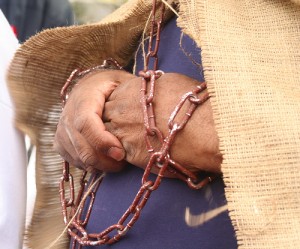Emancipation Without Representation
Tomorrow is Emancipation Day in the District; for most, that means an extra weekend for tax preparation, but it’s worth considering why tax day was delayed this year (and every year when the holiday falls on a Saturday). On April 16th, 1862, slavery ended in the District nine months before President Lincoln would go on to issue the Emancipation Proclamation.
The District of Columbia Compensated Emancipation Act freed almost 3,000 enslaved people while compensating their former masters for the loss of their human property– the only example of compensation by our federal government to former slave-owners.
From the National Archives:
The act brought to a conclusion decades of agitation aimed at ending what antislavery advocates called “the national shame” of slavery in the nation’s capital. It provided for immediate emancipation, compensation to former owners who were loyal to the Union of up to $300 for each freed slave, voluntary colonization of former slaves to locations outside the United States, and payments of up to $100 for each person choosing emigration. Over the next 9 months, the Board of Commissioners appointed to administer the act approved 930 petitions, completely or in part, from former owners for the freedom of 2,989 former slaves.
The act fundamentally altered D.C., where previously, all free and enslaved black residents had to adhere to a strict 10pm curfew or face arrest and torture.
No longer downtrodden, the first freed slaves in the country created the city we know today:
Escaped slaves from Maryland, Virginia, and beyond—as many as 40,000—poured in, colonizing the neighborhoods and building the institutions that would form the foundations of today’s black community.
Less than a decade after the Civil War, an African-American newspaper—hailing the participation of blacks in local government, the passage of civil-rights laws, the founding of Howard University, and the establishment of thriving (though segregated) public schools—would declare: “Probably to a greater extent than elsewhere in the country is the equality of citizens in the matter of public rights accorded in the District of Columbia.” The sounds of the curfew bell and the slave auctioneer’s hammer were fading memories.
D.C. celebrated on April 16th annually from 1866 until 1901. The practice was resumed in 2002, and in 2005, then-Mayor Anthony Williams signed a law that would make Emancipation Day an official public holiday.
But it’s become more than a day for reflecting on the past. Some local leaders who celebrate Emancipation Day are concerned about the city’s future. Anise Jenkins, President of Stand Up for Democracy told The Georgetowner that “We link it to statehood because we need to be equal to the rest of America. We can visit Congress all day, but we won’t be equal to the rest of the country until we have our equal vote in Congress.”
Unlike Wyoming, a state which has a smaller population than our city, the District has no voting rights in Congress, even though it paid over $18 million in federal taxes to the IRS, last year.
E. Ethelbert Miller, the Director of the African American Studies Resource Center at Howard University says that we should consider the holiday in that context. He asks, “What does it mean to be free? To have rights? We talk about freedom but all these years later, we still don’t have the ability to vote.
“Freedom is the first step. Citizenship and the right to vote follow emancipation, so the promise has not been completely fulfilled for D.C. residents. That’s why we use these days to educate people about that issue.”
Not only has the “promise” not been fulfilled, last week, the District endured yet another indignity when riders that would force the city to stop using local funds for abortions while restoring school vouchers were appended to a bill that prevented the government from shutting down.
In response to our rights being bartered away, a Mayor of this city was arrested (for the first time since 1993) while protesting our lack of autonomy:
Gray, in comments after his release, called the arrests a “spark” that he hoped would ignite a firestorm of protest. He called for a public uprising to rival the autocrat-toppling street protests in Tunisia and Egypt. Council member Michael A. Brown (I-At Large) has not been shy in alluding to the civil rights protests of the 1960s, or even the abolition of slavery.
Miller also connects what’s happening locally to recent global events.
“This year Emancipation Day is more important. Around the world, people are struggling for freedom. We are linked to other struggles. This is not just a historical moment, this is an ongoing desire for freedom that people will never give up on. We always have to make sure our youth understand what the struggle for freedom is all about. It’s not just a day to take off work or school, it’s a day to remember.”
-
Anonymous




